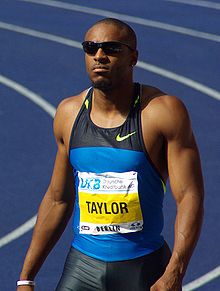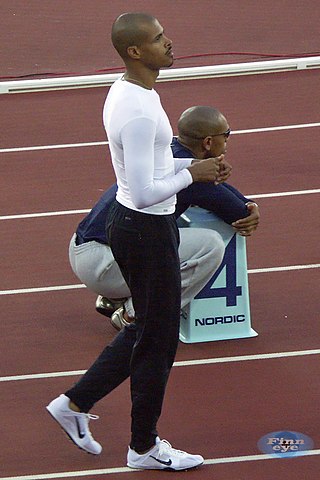
The men's 400 metres hurdles at the 2004 Summer Olympics as part of the athletics program were held at the Athens Olympic Stadium from August 23 to 26. There were 35 competitors from 24 nations. The event was won by Félix Sánchez of the Dominican Republic, the nation's first medal in the men's 400 metres hurdles. Silver went to Danny McFarlane of Jamaica, returning to the podium in the event for the first time since 1992. Naman Keïta's bronze was France's first medal in the event in over 100 years; the last Frenchman to medal in the long hurdles was Henri Tauzin in 1900. The United States' five-Games gold medal streak ended; for only the second time in the history of the event, Americans competed but won no medals.

The men's 400 metres hurdles at the 1988 Summer Olympics in Seoul, South Korea had an entry list of 38 competitors, with five qualifying heats and two semifinals (16) before the final (8) took place on Sunday September 25, 1988. One athlete did not start, so there were 37 competitors from 28 nations. The maximum number of athletes per nation had been set at 3 since the 1930 Olympic Congress. The event was won by 0.04 seconds by Andre Phillips of the United States, the nation's second consecutive and 14th overall victory in the event. Amadou Dia Ba earned Senegal's first medal in the event with his silver. Dia Ba broke up a potential American sweep, as 1976 and 1984 champion Edwin Moses took bronze and Kevin Young placed fourth. Moses was the second man to earn three medals in the event.

The men's 400 metres hurdles was an event at the 1996 Summer Olympics in Atlanta, Georgia. There were 55 competitors from 35 nations. The maximum number of athletes per nation had been set at 3 since the 1930 Olympic Congress. The event was won by Derrick Adkins of the United States, the nation's fourth consecutive and 16th overall victory in the event. Samuel Matete of Zambia earned that nation's first medal in the event with his silver. American Calvin Davis took bronze.
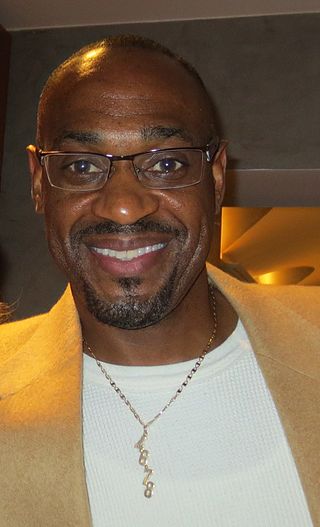
The men's 400 metres hurdles was an event at the 1992 Summer Olympics in Barcelona, Spain. It was held from 3 to 6 August at the Estadi Olímpic Lluís Companys. There were 47 competitors from 35 nations. The maximum number of athletes per nation had been set at 3 since the 1930 Olympic Congress. The event was won by Kevin Young of the United States, the nation's third consecutive and 15th overall victory in the event. Winthrop Graham earned Jamaica's first men's 400 metres hurdles medal with his silver. Kriss Akabusi earned bronze, putting Great Britain on the podium in the event for the first time since 1980. The three medalists had finished in the same order in 1988, just outside of the medals that year in fourth through sixth places.
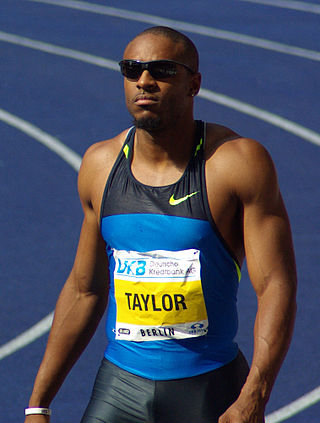
The men's 400 metres hurdles at the 2008 Summer Olympics took place on 16–18 August at the Beijing National Stadium. There were 26 competitors from 19 nations. The event was won by Angelo Taylor of the United States, the nation's 18th victory in the men's 400 metres hurdles. Taylor was the seventh man to win multiple medals in the event, and third to win two golds. The United States completed its fifth podium sweep in the men's long hurdles, as Kerron Clement and Bershawn Jackson took silver and bronze.
The men's 400 metres event at the 2000 Summer Olympics as part of the athletics programme was held at Stadium Australia from 22 to 25 September 2000. Sixty-eight athletes from 44 nations competed. The maximum number of athletes per nation had been set at 3 since the 1930 Olympic Congress. The event was won by Michael Johnson of the United States, successfully defending his 1996 gold medal. It was the fifth in what would ultimately be 7 consecutive American victories stretching from 1984 to 2008 and the 17th overall title in the event by the United States. Gregory Haughton's bronze was Jamaica's first medal in the event since the nation won back-to-back golds in 1948 and 1952.

The men's 400 metres hurdles at the 1980 Summer Olympics in Moscow, Soviet Union had a start list of 22 competitors from 19 nations, with three quarterfinals, two semifinals (16), and a final (8) that took place on Saturday July 26, 1980. The maximum number of athletes per nation had been set at 3 since the 1930 Olympic Congress. The event was won by Volker Beck of East Germany, the nation's first medal in the event. Vasyl Arkhypenko earned silver, the second consecutive Games that the Soviet Union reached the podium in the event. Gary Oakes put Great Britain back on the podium after a one-Games absence with his bronze.

The men's 400 metres hurdles event at the 1928 Olympic Games took place between July 29 & July 30. There were 25 athletes from 13 nations. The maximum number of athletes per nation was 4. The event was won by David Burghley of Great Britain, the first time a hurdler not from the United States had won. Americans Frank Cuhel and Morgan Taylor took silver and bronze. Taylor, who had been the defending champion, was the second man to win multiple medals in the 400 metres hurdles.

The men's 400 metres hurdles event at the 1936 Summer Olympic Games took place on August 3 and August 4. There were 32 competitors from 20 nations. The maximum number of athletes per nation had been set at 3 since the 1930 Olympic Congress. The final was won by American Glenn Hardin. After two Games of silver and bronze medals, it was the United States' first victory since 1920 and sixth overall. However, it was the first time since 1900 that the Americans had only one medalist in the event. John Loaring took Canada's first 400 metres hurdles medal since 1900 with his silver. Miguel White gave the Philippines a bronze in its 400 metres hurdles debut.

The men's 400 metres hurdles event at the 1948 Summer Olympic Games took place July 30 and July 31. There were 25 competitors from 17 nations. The maximum number of athletes per nation had been set at 3 since the 1930 Olympic Congress. The final was won by American Roy Cochran. It was the nation's second consecutive and seventh overall victory in the event. Duncan White won Ceylon's first Olympic medal in any event with his silver. As of the 2016 Games, it remains the only medal won by a male competitor from Ceylon/Sri Lanka; the nation has won one other medal, Susanthika Jayasinghe's silver in the 2000 women's 200 metres. Sweden's first medal in the men's 400 metres hurdles was won by Rune Larsson, taking bronze.

The men's 400 metres hurdles event at the 1932 Olympic Games took place on July 31 and August 1 at the Los Angeles Memorial Coliseum. There were 18 competitors from 13 nations. The 1930 Olympic Congress in Berlin had reduced the limit from 4 athletes per NOC to 3 athletes. The event was won by Bob Tisdall of Ireland, the nation's first medal in the event in its 400 metres hurdles debut. The United States took silver and bronze, extending its streak of taking at least silver in all 7 appearances of the event to that point. Taylor became the first man to earn three medals in the event, adding to his 1924 gold and 1928 bronze. Defending champion David Burghley of Great Britain finished fourth.
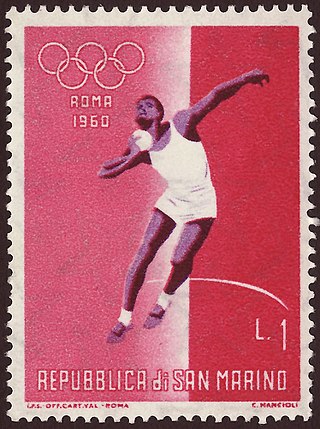
The men's 400 metres hurdles event at the 1960 Olympic Games took place between August 31 and September 2. There were 34 competitors from 23 nations. The maximum number of athletes per nation had been set at 3 since the 1930 Olympic Congress. The event was won by Glenn Davis of the United States, the first man to successfully defend an Olympic title in the 400 metres hurdles. As of the 2016 Games, he remains the only man to do so; three others have won two gold medals in the event, but all three did so in nonconsecutive Games. It was the United States' fifth consecutive and 10th overall victory in the event. The Americans also completed their second consecutive medal sweep in the event, as Cliff Cushman took silver and Dick Howard took bronze.

The men's 400 metres hurdles event at the 1952 Summer Olympics took place July 20–21, 1952 at the Helsinki Olympic Stadium. There were 40 competitors from 24 nations. The maximum number of athletes per nation had been set at 3 since the 1930 Olympic Congress. The final was won by American Charles Moore. It was the nation's third consecutive and eighth overall victory in the event. The Soviet Union, in its debut, and New Zealand each earned their first medal in the men's 400 metres hurdles, with Yuriy Lituyev's silver and John Holland's bronze, respectively.

The men's 400 metres hurdles competition at the 2012 Summer Olympics in London, United Kingdom took place on 3–6 August at the Olympic Stadium. There were 49 competitors from 33 nations. The event was won by Félix Sánchez of the Dominican Republic, the second victory in the men's long hurdles for both the man and the nation. Sánchez was the eighth man to win multiple medals in the event and fourth to win two golds. Michael Tinsley of the United States earned silver. Javier Culson's bronze was Puerto Rico's first medal in the event.

The men's 400 metres hurdles was an event at the 1976 Summer Olympics in Montreal. The competition was held from July 23, 1976, to July 25, 1976. There were 22 competitors from 16 nations. The maximum number of athletes per nation had been set at 3 since the 1930 Olympic Congress. American Edwin Moses won the final in a world record and Olympic record time of 47.64 seconds, winning by 1.05 seconds. His time was initially noted as one hundredth slower, but this was rounded up after an analysis of the photo finish. It was the United States' first victory in the event since 1964 and 12th overall. Fellow American Michael Shine took silver. Yevgeniy Gavrilenko earned the Soviet Union's first medal in the event since 1952 with his bronze. Great Britain's three-Games podium streak in the event ended.

The men's 400 metres hurdles at the 1984 Summer Olympics in Los Angeles, California had an entry list of 45 competitors from 30 nations, with six qualifying heats and two semifinals (16) before the final (8) took place on Sunday August 5, 1984. The maximum number of athletes per nation had been set at 3 since the 1930 Olympic Congress. American Edwin Moses won his second Olympic gold medal after 1976, while his 18-year-old teammate Danny Harris took the silver medal. Moses' gold was the United States' 13th victory in the event. Moses was the sixth man to win multiple medals in the event, and the second to win multiple golds. Harald Schmid of West Germany took bronze, giving that nation its first medal in the 400 metres hurdles since 1968.
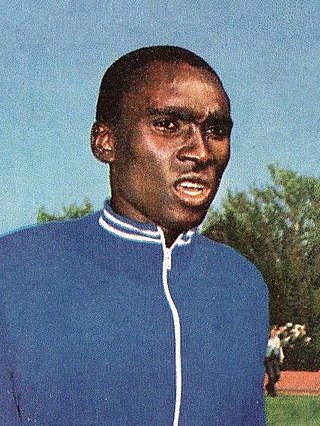
The men's 400 metres hurdles was an event at the 1972 Summer Olympics in Munich. The competition was held on 31 August - 2 September. There were 37 competitors from 25 nations. The maximum number of athletes per nation had been set at 3 since the 1930 Olympic Congress. The event was won by John Akii-Bua of Uganda, the nation's first medal in the event and first gold medal in any Olympic event. Ralph Mann returned the United States to the podium after a one-Games absence with his silver medal, while David Hemery added a bronze to his 1968 gold to become the fifth man to earn multiple medals in the event while extending Great Britain's podium streak in the 400 metres hurdles to three Games.
The men's 400 metres hurdles competition at the 1956 Summer Olympics in Melbourne, Australia took place on November 23–24 at the Melbourne Cricket Ground. There were 28 competitors from 18 nations. The maximum number of athletes per nation had been set at 3 since the 1930 Olympic Congress. The event was won by Glenn Davis of the United States, the nation's fourth consecutive and ninth overall victory in the men's 400 metres hurdles. Eddie Southern (silver) and Josh Culbreath (bronze) completed the American sweep, the third time that the United States had swept the medals in the event.
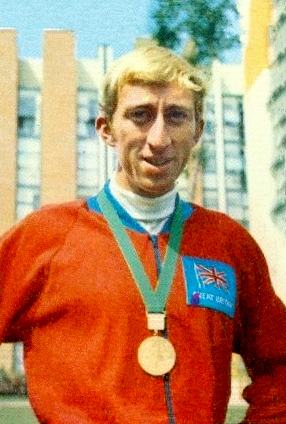
The men's 400 metres hurdles competition at the 1968 Summer Olympics in Mexico City, Mexico took place on October 13–15 at the Estadio Olímpico Universitario. There were 30 competitors from 24 nations. The maximum number of athletes per nation had been set at 3 since the 1930 Olympic Congress. The event was won by David Hemery of Great Britain, the nation's first victory in the men's 400 metres hurdles since 1928 and second overall—second-most after the United States' 11. The win broke a streak of 6 consecutive American victories. Further, the United States failed to medal in the event for the first time ever; in all 13 previous times the event was held, the American team had at least a silver medalist. Great Britain was the first nation other than the United States to have two medalists in the event in the same Games, as John Sherwood took bronze. Gerhard Hennige of West Germany was the first German hurdler to earn a medal in the event, finishing between the two Britons with silver.

The men's 400 metres hurdles event at the 2016 Summer Olympics took place between 15–18 August at the Olympic Stadium. There were 47 competitors from 33 nations. The event was won by Kerron Clement of the United States, the nation's 19th victory in the men's long hurdles. Clement was the ninth man to win multiple medals in the event. Both Kenya and Turkey earned their first medals in the men's 400 metres hurdles, the former with Boniface Mucheru Tumuti's silver and the latter with Yasmani Copello's bronze.
